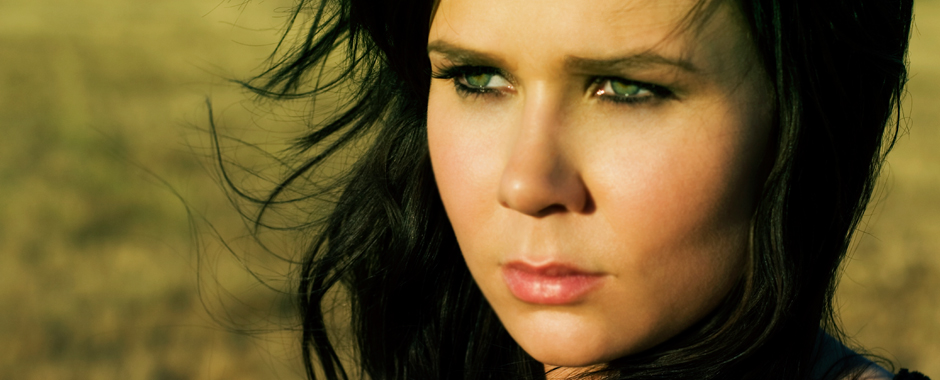Amy Kuney

Bio:
With Amy Kuney, appearances are certainly deceiving. Sure, the singer/songwriter looks youthful, perhaps even younger than the early 20s bracket she occupies, but just wait until she sits down at a piano and starts singing. The onstage presence and authority she displays is impressive for an artist of any age, and that’s before you even notice her songwriting, which resounds with finely observed details and engaging left turns.
Perhaps this is because Kuney isn’t your typical young artist. She has nearly 20 years of musical experience, having begun piano lessons at age four. Between church performances and piano recitals, she’s been onstage for most of her life, to say nothing of 100 live dates in the past year. And her childhood spent partially in Honduras has given her life experience beyond that of most Americans.
In fact, if you ask Kuney, it was more life experience than she was expecting. At 17, she and a group of friends were kidnapped by rebels while on a Guatemala sightseeing trip. (Their captors, by the grace of a higher power, eventually let them go), but the experience, harrowing as it was, threw Kuney’s nascent songwriting into high gear. “I built a studio in my basement using shower curtains and mattresses and I just put everything into my writing,” she recalls. “I wrote this song, ‘How The Wind Must Feel’, and sent a recording of it to a producer in Los Angeles named Peter Barker. That’s how it all started.”
Music supervisors have taken notice. Not only have Kuney’s songs landed on One Tree Hill and the daytime drama Passions, she also played a folk singer on a memorable episode of Gilmore Girls, an occurrence she modestly chalks up to “beginner’s luck.” Now, as debut Bird’s Eye View is released, more will have the opportunity to know (and love) the talented songwriter that fellow artist Kate Voegele calls “an amazing lyricist” and compares to Fiona Apple and Sarah McLachlan and whose voice Ann Powers, of the Los Angeles Times, calls “especially lovely”.
Amy Kuney was born in Oklahoma and spent her early life in Tulsa, a middle child in a large family. It was an unremarkable suburban existence until her father decided, on the heels of Hurricane Mitch’s devastation, to move the family to Honduras to do missionary work. Amy was 13 at the time.
So exit suburban housing and trips to the mall, and enter a foreign culture via a cinder-block home, its courtyard surrounded by razor wire. At first, Kuney rebelled. “I had been very uncooperative about living in Honduras. And I very purposefully had not learned the language. I didn’t really embrace the culture. And even when I wanted to learn Spanish there was a subliminal block there and it just took forever.”
There was one thing, however, that Kuney got in Honduras that was largely unavailable in the U.S—silence. “It really jarred me,” she says. “I had to figure out how to entertain myself. At the very beginning we had no radio, no television and we didn’t know anybody there.” So Kuney spent even more time at the piano, and eventually learned the guitar. At the same time, she wrote short stories and poems before she penned her first song.
But before long she was filling up her notebooks and sending songs to L.A. producers she randomly found on the Internet. This was how she found Peter Barker, who can be thankful that his last name begins with a “B” since Kuney was calling alphabetically. Barker eventually signed her and his label is releasing her debut album, Bird’s Eye View, this fall.
Though she’s co-written with others in the past, all of the songs on Bird’s Eye View come straight from Amy Kuney’s notebook, voice and unique perspective. “I’m a bit of a control freak,” she admits. “I can’t put something out unless it’s something I can stand behind 100 percent.” And the album is all the better for being the direct result of Kuney’s life experiences, from the knowing exhortation that “there is life beyond the razor wire” in “Simple Things” to the intriguing situation of being “a third party at a table for two” in “Love Is Trippy.”
“I wouldn’t consider myself a songwriter necessarily; I really see myself more of a storyteller,” she says. “I’ll start by writing the story behind it before I actually turn any of it into a lyric.”
In terms of production, while the arrangements definitely serve the songs, Bird’s Eye View is the furthest thing possible from a stripped-down, coffeehouse-friendly singer/songwriter album. Such choices aren’t surprising once Kuney reveals her love for artists like Rufus Wainwright and Jon Brion, whose left-turns are legendary.
“I didn’t want this album to sound like any other,” Kuney asserts. “I didn’t want anyone say to that the production reminds them of someone else. I wanted it to stand on its own.” Just one track, “Rocket Surgery”—with its sampled Enrico Caruso backing vocal, Dixieland horn section and wide-panned handclaps—is all the evidence a listener needs to realize the mission was accomplished and then some. But that doesn’t mean that the infectious hooks of these songs, led by Kuney’s forceful alto, would sound out of place on the airwaves. “We tried to make it interesting but also easy to listen to,” Kuney observes. “And I think we found a good balance.”
And of course, it’s always easy to sound comfortable in the studio if you’re knocking ‘em dead onstage, and Kuney’s spent the past year doing just that (check YouTube for proof), leaping just as enthusiastically on stage in front of three people as in front of 300, and enduring the inevitable trials. “I stayed in this hotel in Spokane and there was blood on the shower curtain, then at 3 a.m. someone was jumping against my door, trying to get it open,” she recalls. “Then in Nashville I got to watch an actual drug bust from my room at night.”
While the sheltered, suburban Amy Kuney might have been freaked out by these road rigors, the post-Honduras Kuney took it in stride. After all, she owes her musical career to that then-unwelcome sojourn. “If I had not moved to Honduras I’d probably still be in Oklahoma, wanting to do what I’m doing now but without the time or the energy to make it happen. Fortunately, I’ve gotten to live a very exciting life.”
